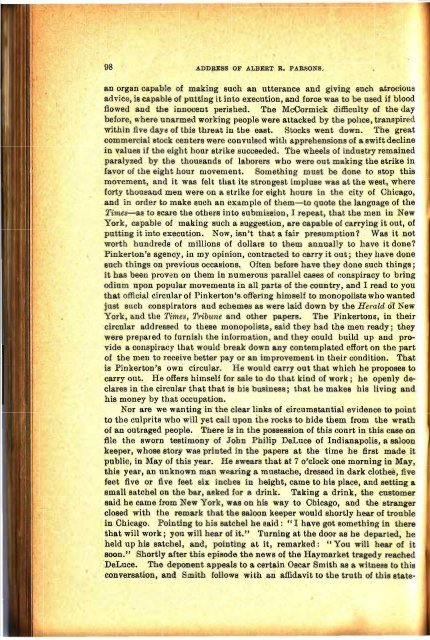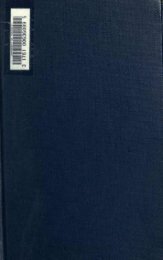The Chicago Martyrs by John P. Altgeld
The Chicago Martyrs by John P. Altgeld
The Chicago Martyrs by John P. Altgeld
Create successful ePaper yourself
Turn your PDF publications into a flip-book with our unique Google optimized e-Paper software.
98<br />
ADDJ,tESS OF ALBERT R. PARSONS,<br />
ADDRESS. OF ALBERT R.<br />
PARSONS.<br />
99<br />
an organ capable of making such an utterance and givin~ such atrocious<br />
advice, is capable of putting it into execution, and force was to be used if blood<br />
flowed and the innocent perished. <strong>The</strong> McCormick difficulty of the day<br />
before, where unarmed working people were attacked <strong>by</strong> the polIce, transpired<br />
within five day~ of this threat in the east. Stocks went down. <strong>The</strong> great<br />
commercial stock centers were convulsed with apprehensions of a swift decline<br />
in values if the eight hour strike succeeded. <strong>The</strong> wheels of industry remained<br />
paralyzed <strong>by</strong> the thousands of laborers who were out making the strike in<br />
fa,VQr of the eight hour movement. Something must be done to stop this<br />
movement, and it was felt that its strongest impluse was at the west, where<br />
forty thousand men were on a strike for eight hours in the city of <strong>Chicago</strong>,<br />
and in order to make such an example of them-to quote the language of the<br />
Times-as to ~care the others into submission, I repeat, that the men in New<br />
York, capable of making such a suggestion, are capable of carrying it out, of<br />
putting it into execution. Now, isn't that a fair presumption? Was it not<br />
worth hundreds of' millions of dollars to them annually to have it done?<br />
Pinkerton's agency, in my opinion, contracted to carry it out; they have done<br />
such things on previous occasions.. Often before have they done such thinKs;<br />
it has been proven on them in numerous parallel cases of r,onspiracy to bring<br />
odiuin upon popular movements in all parts of the country, and I read to you<br />
that official circular of Pinkerton's,offering himself to monopolists who wanted<br />
just such conspirators and schemes as were laid down <strong>by</strong> the Herald 01 New<br />
York, and the Times, Tribune and other papers. <strong>The</strong> Pinkertons, in their<br />
'circular addressed to these monopolists, said they had the men ready; they<br />
were prepared to furnish the information, and they could huild up and provide<br />
a conspiracy that would break down any contemplated effort on the part<br />
of the men to receive better payor an improvement in their condition. That<br />
is Pinkerton's own circular.. He would carry out that which he proposes to<br />
carry out. He offers himself for sale to do that kind of work; he openly deelares<br />
in the circular that that is his business; that he makes his living and<br />
his money <strong>by</strong> that occupation.<br />
Nor are we wanting in: the clear links of circumstantial evidence to point<br />
to the culprits who will yet call upon the rocks to hide them from the wrath<br />
of an outraged people. <strong>The</strong>re is in the possession of this court in this case on<br />
file the sworn testimony of <strong>John</strong> Philip DeLuce of Indianapolis, a saloon<br />
keeper, whose stor¥ was printed in the papers at the time he first made it<br />
public, in May of this year. He swears that at 7 o'clock one morning in May,<br />
this year, an unknown man wearing a mustache, dressed in dark clothes, five<br />
feet five or five feet six inches in heiKht, came to his place, and setting a<br />
amaH satchel on the bar, asked for a drink. Taking a drink, the customer<br />
said he came from New York, was on his way to <strong>Chicago</strong>, and the stranger<br />
closed with the remark that the saloon keeper would shortly hear of trouble<br />
in <strong>Chicago</strong>. Pointing to his sll,tchel he said: "I have got something in there<br />
that will work; you will hear of it." Turning at the door as he departed, he<br />
held up his satchel, and, pointing at it, remarked: "You will hear of it<br />
soon." Shortly after this episode the news of the Haymarket tragedy reached<br />
DeLuce. <strong>The</strong> deponent appeals to a certain Oscar Smith as a witness to this<br />
conversation, and Smith follows with an affidavit to the truth of this state-<br />
ment; that was away back in May. Now, if this is to be a case of conjecture,<br />
if this is to be a case of opinion, I submit if that man's testimony is not as<br />
worthy of the consideration of this court as is the testimony of Harry Gilmer.<br />
Or, if your ,honor still assumes that we instigated some one else to hurl the<br />
(bomb, I submit if the threats of the monopolist papers, and the proposals of<br />
, Pinkerton to carry them out, do not show that some mercenary in their em"ploy<br />
performed the deed resulting in the Haymarket tragedy. <strong>The</strong> Pinkerton force<br />
.a.dvertises to carryon this kind of work. Pinkerton advertises in his circular<br />
that he is ready to do this kind of a job. <strong>The</strong> New York Bel'ald and New<br />
'York Times say the market is going down in consequence of the contemplated<br />
strike on the first of May, and say that the leaders must be arrested and<br />
.thrust into prison, and thus terrify the others into submission <strong>by</strong> making<br />
examples of the leaders. This is what the Times says; this is what Pinkerton<br />
says. About this time some one, as testi.fied to <strong>by</strong> three reputable witnesses,<br />
stopped at Indianapolis; that was in May; the Haymarket tragedy<br />
was the fourth. This man testifies to that fact. A stranger stops there. He<br />
says: "I am going to <strong>Chicago</strong>. I have something that Iwill work.. You will<br />
hear from it." <strong>The</strong> man was in his cups, no doubt; probably he drank too<br />
much. <strong>The</strong> Pinkertons are not all temperance men; they sometimes take a<br />
little, and sometimes possibly take a little too much; possibly he talked a<br />
little more than he ought to have talked; possibly he didn't care, but at any<br />
rate it is sworn to that he said it; he came to <strong>Chicago</strong>, and the bomb was<br />
heard from and heard around the world. Your honor, is this an unreasonable<br />
assumption? It is far more likely, much more reasonable than your honor's<br />
surmise that I instigated some one to do it, Is this not within the possibility<br />
of human events? Might this not be the case? Is it proven, your honor,<br />
incontestibly and uncontrovertibly, that it was not done <strong>by</strong> this man, that it<br />
w~s not done <strong>by</strong> a Pinke~ton? Is it proven beyond any possibility of a doubt<br />
that I and some of these men here threw that bomb, or knew of its being<br />
thrown? It is not, your honor. It is not established. <strong>The</strong> testimony does<br />
not show it.<br />
<strong>The</strong>se squealers for the State, Waller and Schroeder, both state that this<br />
meeting was for defense, that it had no reference to the Haymarket, had nothing<br />
to do with it; they were not even to go there; there was no difficulty expected<br />
there. <strong>The</strong>se are the State's own witnesses and against the testimony<br />
of Gilmer, that Spies lit the bomb, which is ridiculous in itself, absurd, the<br />
very idea of such thing. Mr. Bonfield and Lieutenant Haas said that the bomb<br />
was thrown south of the alley about fifteen feet, and Burnett comes upon 'the<br />
stand-a man who is unimpeached-and swears that he stood <strong>by</strong> the man who<br />
did throw the bomb, and saw him light and throw it. All this against Gilmer,<br />
the affidavit of DeLuce, and the statements of the witnes'3es on the part of<br />
the prosecution. I submit that we, for this reason are entitled, and have a<br />
right to stand here and clliim a new hearing before you. I am told that it is<br />
a statement from the prefecture of the Paris police, that the police themselves<br />
instigate troubles ofteu to bring about certain results. In police circles<br />
lluch p rsons are known as procurators or provocatives. I don't know whether<br />
this Ie true or not. You are a judge and a court; you are familiar with these<br />
tblnge. ow, tide description of the stranger dressed in dark clothes, and<br />
\
















